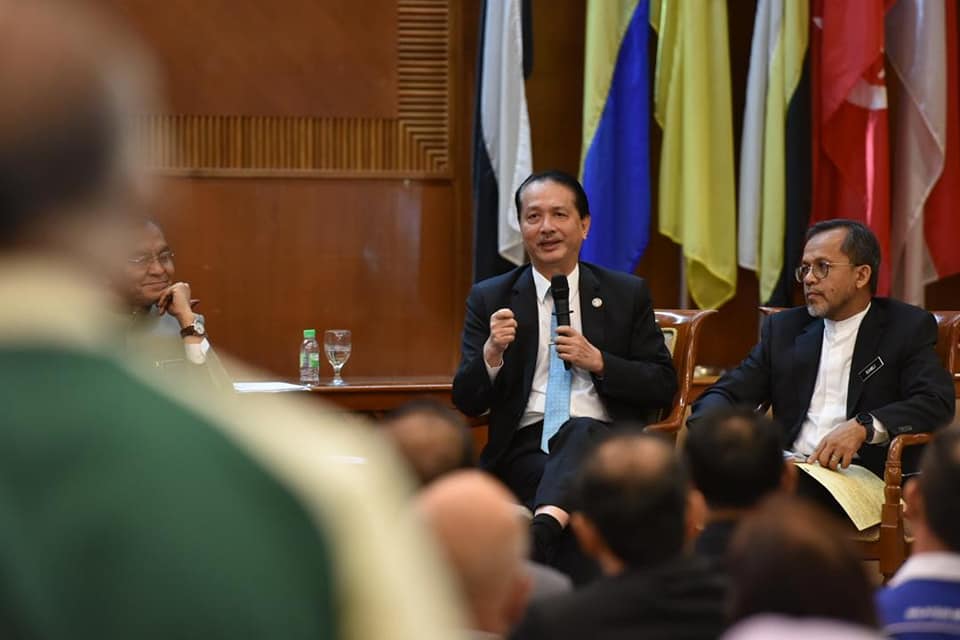KUALA LUMPUR, Feb 26 — The Ministry of Health (MOH) has backed down from its controversial plan to incarcerate doctors and other medical practitioners for rejecting patients’ prescription requests.
Instead, MOH decided that the Poisons (Amendment) 2019 Bill will be revised to include a clause on prescriptions upon request instead of mandatory prescriptions, and to remove any threat of jail time or a fine for non-compliance, after heavy backlash from physicians particularly.
The move was announced during a Putrajaya town hall chaired by Health director-general Dr Noor Hisham Abdullah, who is also the Malaysian Medical Council (MMC) president, yesterday morning over the matter. Doctors, dentists, veterinarians, and pharmaceutical companies, except for one pharmacists’ group, had welcomed it.
“Non-compliance will be dealt with under existing Acts for the relevant party (dentists, veterinarians, pharmacists, and medical doctors) and will be out of the Poisons Act,” one source who attended the meeting told CodeBlue.
First announced last year, the Bill came under fire after CodeBlue reported that it would effectively criminalise doctors, dentists, and veterinarians who decline to issue medicine prescriptions asked by patients by sentencing them to maximum five years’ imprisonment, a fine not exceeding RM50,000, or both.
After uproar from the medical fraternity, then-Health Minister Dzulkefly Ahmad last year postponed the second reading of the Bill and said he would consider changing the incarceration threat to a breach of ethics or misconduct.
MOH’s about-turn on proposed amendments to the Poisons Act means that medical practitioners are still duty-bound to give a prescription to a patient if they ask for one. If their request is declined, they can lodge a complaint — as is the case currently. MOH will now strengthen existing protocols.
“The DG (director-general) said he doesn’t agree with the criminalisation of doctors who don’t give prescriptions,” another source claimed.
“He also said there will be a mechanism in place for the public to complain about all those who didn’t give prescriptions, and that they’ll be referred to their respective councils,” the source added.
Complaints involving doctors are referred to the MMC, dentists to the Malaysian Dental Council, pharmacists to the Pharmacy Board Malaysia, and veterinarians to the Malaysian Veterinary Council.
Medical practitioners will face disciplinary hearings at their respective councils or boards, which will then base their recommended punishments or warnings on their existing guidelines and professional codes of conduct.
The Bill had come under fire because groups representing doctors, dentists, and veterinarians claimed they were not consulted over the decision. They also pointed out that existing laws were in place to manage health practitioners, and there was no need for another one.
The episode also highlighted an apparent rift in the ministry, with the top-ranking Dr Noor Hisham saying he and then-Deputy Health Minister Dr Lee Boon Chye were not aware of the new changes until they were criticised in public, which also upset stakeholders.
According to one of CodeBlue’s sources, Dr Noor Hisham yesterday said he was disappointed that there were no stakeholder engagements for the amendment Bill and apologised, breaking from MOH’s long-standing view that they did consult stakeholders.
MOH yesterday also pledged to formulate guidelines and regulations on the legalisation of e-prescriptions, as proposed for in the Bill. This would entail practitioners signing off prescriptions with a digital signature and sending them to a registered pharmacist electronically.
Stakeholders had previously raised concern over the need for ethical and regulatory enactments in place to ensure patient safety, which would potentially give rise to unethical and dangerous practices.
Nevertheless, the Bill will still expand the powers of MOH enforcement officials to allow them to search private clinics, hospitals, or other premises, which stakeholders had strongly protested against before.
The same source CodeBlue spoke to said MOH officials yesterday defended the decision to retain this clause by saying the Bill targets errant manufacturers and businessmen, and not health practitioners.
“The ministry is not taking our concerns seriously over this, despite them being made in writing,” the source said. “They are just telling us, ‘Don’t worry, they will only go and raid when there is proof, complaints, and after the head of the (Pharmaceutical Services Department) services has given approval, blah blah blah’.
“I’m very concerned about this,” the source said. “These kinds of laws can also give rise to little Napoleons. What if the officer comes and raids my clinic without doing due diligence, not doing investigation before that?
“A clinic is raided and enforcement officers come in and shut it down… the damage is already done (to our reputation) as GPs (general practitioners).”
The matter is considered a done deal and no more engagement sessions other than yesterday’s meeting and an earlier one on February 13 will be convened by MOH. The revised Bill is still expected to be brought to Parliament in March as planned, if the Parliament meeting continues.
However, this still depends on whether the revised Bill gets approval from the new health minister. Malaysia’s Cabinet has since been dissolved after Prime Minister Dr Mahathir Mohamad’s shock resignation on Monday.








